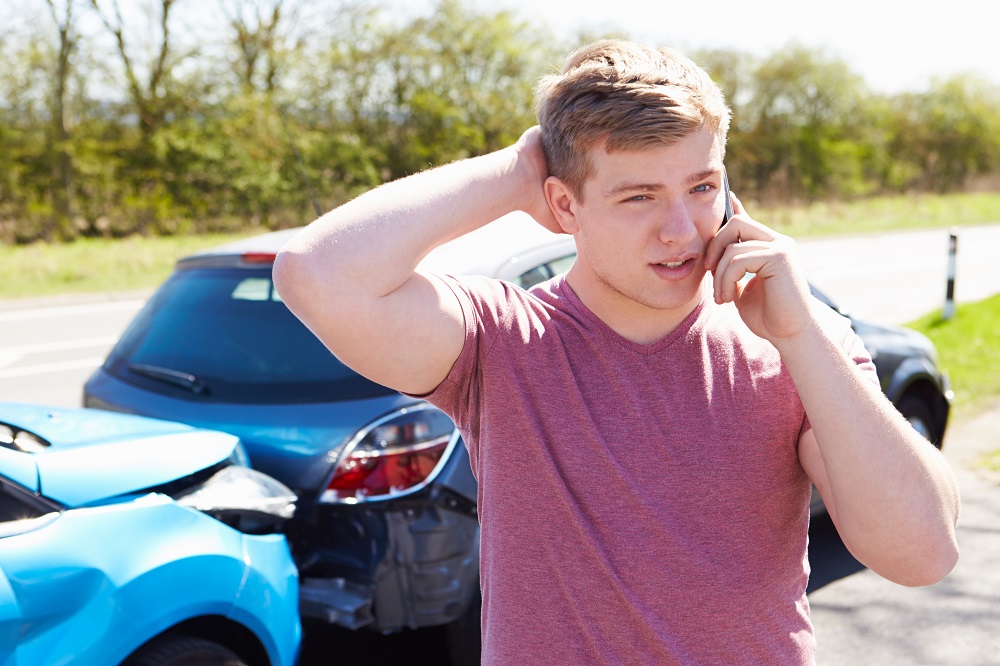Getting a call that your teenager has been in a car accident is extremely startling and scary. Emotions and worry go through your mind, wondering if they are okay. Not only is it an emotionally difficult time, but the logistical challenges after a car accident can be a nightmare.
During this time, it’s incredibly important to offer parental support and guidance to your child, no matter whose fault the accident was. Keep reading to learn tips for how to deal with this scenario.
Immediate Steps
If your teen calls in the immediate aftermath of an accident, guide them through the important first steps. First, tell them to put on their hazards and pull over if they can, to ensure their car is safe and away from moving traffic. Next have them check themselves for injuries, as well as anyone else involved, and call emergency services. Even if injuries seem minor, it’s best practice to get everyone checked medically and have police on the scene to make the report. Police can also help secure the scene by assisting with traffic control.
When the officers arrive, encourage your teen to share all relevant information with them. The time, parties involved, and details of the collision are all important to relay. This is also a good time to exchange contact information with other drivers involved and collect contact details from any witnesses on the scene. It’s also important to take pictures of the incident if possible, including vehicle damage, license plates of all cars involved, and injuries.
Offering Support
The most important thing to remember when speaking with your teen after their accident is to stay calm. This will allow you to reassure your child and help them stay calm, so you can both think clearly. If your teen expresses feelings of shock, fear, or guilt, make sure to validate their feelings. This is a scary situation, especially if it’s never happened before. You can offer emotional support and even physical support by going to assist them or give them a ride. Encourage open communication during this time and don’t yell or shame them for the accident. Even if they were at fault for the accident, they can learn from their mistake without added guilt.
Sometimes car accidents can lead to driving anxiety or new related fears. It’s not uncommon to develop PTSD from a serious accident. Be sure to acknowledge their apprehension and offer support without pressure. You can discuss coping mechanisms for their anxiety like deep breathing, and help them find professional therapy if needed.
Practical Considerations
After getting medical attention and filing a police report, the next step after a car accident is to contact your insurance company. Your teen might need help with the process of filing an insurance claim and gathering the necessary documents. In some cases, it’s helpful to seek legal advice, especially if the accident resulted in injuries. Insurance companies have been known to lowball their settlement offers to claimants, according to Waco personal injury attorneys.
Working with a local legal expert ensures you receive guidance that aligns with Georgia’s specific traffic and liability laws. When navigating injury claims or complex insurance negotiations, the support of the best auto accident lawyers near Atlanta, GA, can make a significant difference in the outcome. These professionals understand the nuances of local court systems and can advocate effectively on your behalf.
Next, you will need to find a reliable repair shop and navigate the process of fixing the damaged vehicle. You can encourage your teenager to call around shops themselves and get a quote, as well as look at online reviews. This is a great lesson for their future. Be there to help answer questions and guide them in the right direction. You can also discuss temporary transportation options while the car is being fixed.
This is also a good time to review safety tips with your child. You can sign them up for a defensive driving class, so they can learn techniques for how to safely swerve or otherwise avoid an accident. It can be hard to get teenagers to listen to their parents, so a driving class is a great way to teach them better driving habits or identify areas for improvement. It’s always good to refresh your skills.
Rebuilding Confidence and Moving Forward
Moving forward after a car accident is an important step in personal growth. It’s a time to reflect on any mistakes made and strengthen your resilience. Use this as a learning opportunity with your teen, and don’t forget to celebrate their responsible actions after the accident. When they feel comfortable driving again, start with short, low-stress drives in familiar environments. You can accompany them if they would like it, gradually building their confidence and independence.
Remember to continue offering support and communication, and remind your child that these things happen. It’s a good lesson in acknowledging challenges or mistakes, but highlighting emotional growth and continued driving confidence.

